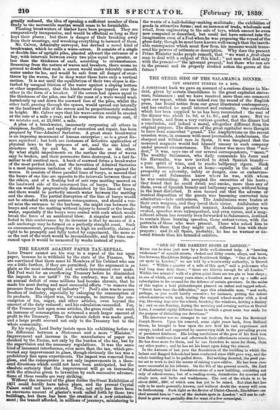THE REASON AGAINST PAPER TAX-REPEAL. Lon]) DERBY cannot see his
way to a repeal of the tax upon paper, because he is withheld by the state of the Finance. We are convinced that there must be Members of his Cabinet who can see a little further, if they are permitted, for the argument is as plain as the most substantial and certain investment ever made. Did Peel wait for an overflowing Treasury before he diminished the imposts in our tariff ? On the contrary, was it not when an annual deficit of some millions had become chronic, that he made his most daring and most successful efforts "to remove the pressure from the springs of industry " ? Peel's aim was to secure freedom of industry, especially by enlarging the consumption of its products. His object was, for example, to increase the con- sumption of tea, sugar, and other articles, even beyond the amount of the duty reduced ; and his calculation succeeded. For, if the Treasury lost upon some articles, the gross result was such an increase of consumption as returned a much larger amount of profit to the Treasury. Thus the chronic deficit was made good, and a large profit accrued not only to the Treasury but to the whole community. By his reply, Lord Derby insists upon his exhibiting before us ce the difference between a Statesman and a mere " 31. fifer." Improvement and increase in the manufacture of paper are checked by the Excise, not only by the burden of the tax, but by the supervision and the necessary regulations. It was the same kind of incessant interference, even more than the tax, which pre- vented any improvement in glass, though obviously the tax was a prohibitory fine upon experiments. The impost was removed from glass, and the consequence is not only improvements in a thou- sand directions which could not have been anticipated, but the absolute certainty that the improvement will go on increasing with the stimulus given to invention by each successive advance. Some of these results are very striking. Without the removal of the glass duties the Great Exhibition of 1851 could hardly have taken place, and the present Crystal Palace could not have existed. Now, not only has there been an enormous amount of glazier's work called forth by those two buildings, but there has been the creation of a new entertain- ment; the transit afforded, in millions of journeys, ministering to
the wants of a half-holiday-making multitude ; the exhibition of goods in attractive forms ; and an increase of trade, wholesale and retail, from engineering to the sale of toys, which cannot be even now computed or described, but could not have entered into the imagination even of a Peel when he was proposing the repeal of the glass duty, though he must have known well enough that the inevit- able consequence which must flow from his measure would trans- cend his powers of estimate or description. Why does the present Prime Minister make people remark, that " we want a first-class man to deal with a subject of this kind ; " not men who deal only with the present—" the ignorant present," but those who can see in the present and its properly studied action the germs of the future ?


























 Previous page
Previous page